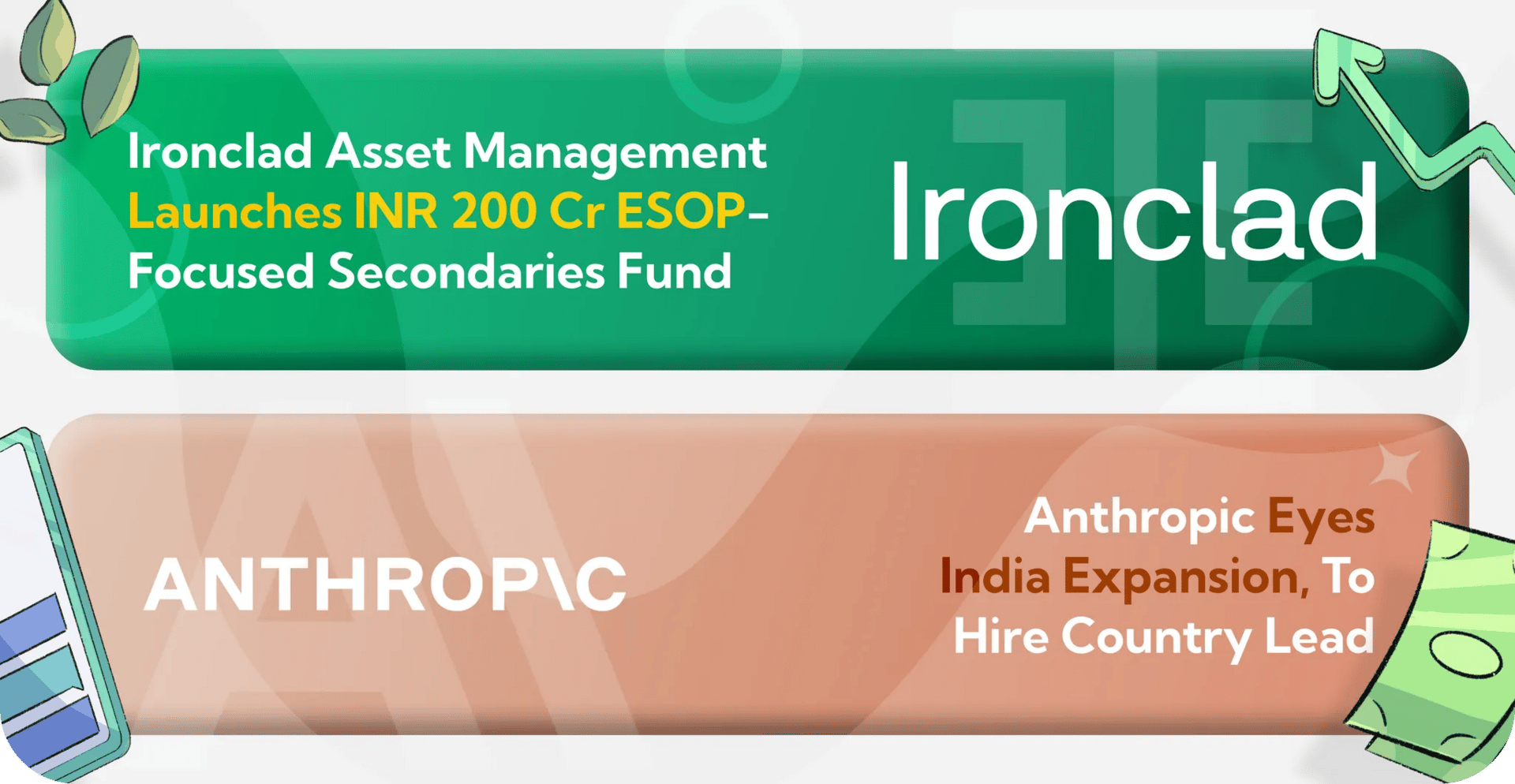- Startup Chai
- Posts
- Cleartrip’s Fragile Balancing Act, Ironclad's New Fund, and Anthropic Eyes India
Cleartrip’s Fragile Balancing Act, Ironclad's New Fund, and Anthropic Eyes India
Plus C-CAMP & NIMHANS Team Up, and fundraising news about Fyno, Ignosis and Assessli

Cleartrip was once the sleek alternative in India’s travel booking wars, but today it stands as the only major OTA still bleeding red ink while rivals boast profits. It’s crisis isn’t a blip of bad quarters; it’s a structural deficit baked into its model at precisely the moment Indian online travel has turned profit-first. The headline math is unambiguous. In FY24, Cleartrip earned ₹97.2 crore in operating revenue on ₹988 crore of expenses and booked a loss of ₹810.3 crore - spending a little over ₹10 to make every rupee! Even after tightening in FY25, it still spent more than ₹5 for every rupee of revenue: ₹169.2 crore in operating income against ₹885.8 crore of costs, with losses of ₹651.1 crore. The improvement shows effort; the ratios still scream dependence on subsidies.
That deficit isn’t happening in a vacuum. India’s travel-tech demand has snapped back and scaled. Online travel market GMV has expanded sharply, mobile now drives the majority of bookings, and peers are printing profits. MakeMyTrip reported record-scale revenue and profits; EaseMyTrip continues to stay in the black; Ixigo’s focus is pushing growth; and Yatra’s B2B pivot has stabilized margin. In other words, category tailwinds are real, but they’re accruing to operators with clear moats and operating leverage.
Cleartrip’s burn is not just “high”; it’s misdirected. The company pushed ₹524.9 crore of discounts in FY24 and ₹608.2 crore in FY25 - multiple times its operating revenue - training a user base to transact on price, not product. When the acquisition engine is a coupon cannon and the cross-sell to hotels is anaemic, lifetime value never outruns CAC. That’s exactly what the share data says: Cleartrip holds a meaningful 13.7% of Air GBV, but a negligible 1.9% of Hotels - the category that carries 15-25% commissions and underwrites OTA profitability. The result is volume without value.
The market structure compounds the problem. MakeMyTrip’s house-of-brands dominance - 56.9% in air, 56.6% in hotels, 75.2% in intercity bus - creates superior CLV, supplier terms, and loyalty flywheels. Ixigo’s specialization has carved out nearly half the non-IRCTC rail niche and a durable second place overall. EaseMyTrip’s operational minimalism makes its “no fee” promise affordable and sticky. Cleartrip, by contrast, is stuck in the worst possible quadrant: heavy spend in low-margin air, weak share in high-margin hotels, and no singular edge that resets its economics.
Post-acquisition by Flipkart, the thesis was obvious: bolt a travel funnel onto a 350-million-user commerce pipe and push non-cash value via SuperCoins. To its credit, Cleartrip has tried to weaponize the ecosystem - campaigning through Big Billion Days, introducing a “Visa Denial Cover” to de-risk high-value outbound bookings, expanding hotel supply, and talking up growth outpacing the market. But the numbers show most of the lift still comes from cash-burning, not balance-sheet-light perks.
Management churn has not helped. CEO, CFO, and CBO exits in a short window rarely happen in companies with settled strategy and clear operating momentum. Churn begets inconsistency, and inconsistency is expensive; meanwhile, profitable rivals are compounding advantages - from locked-in supplier exclusives to loyalty programs that make switching costly.
If Cleartrip wants to become financially stable, it has to rethink how it plays the game. Instead of handing out discounts just to boost flight bookings, it should link every deal to a hotel or package, so subsidies drive profitability rather than just traffic. It needs to rebuild its B2B arm, using Flipkart and Walmart’s networks to lock in long-term contracts with corporates, which would make revenues more predictable. Cashback-heavy campaigns should give way to Flipkart’s SuperCoins, so the cost of incentives doesn’t keep hitting Cleartrip’s books. Most importantly, it should stop chasing the vanity of being the “second-largest OTA” and focus on niches where it can win - premium outbound travel, curated hotel stays, or Tier-2 and Tier-3 markets.
The uncomfortable truth is that Flipkart’s ownership is both the safety net and the trap. Deep pockets let Cleartrip survive long enough to fix the model; deep pockets also delay the urgency to do so. Until Cleartrip builds a meaningful hotel business, every jump in flight bookings may look like growth but will actually weigh the company down, pulling margins in the wrong direction.
India’s travel-tech story will keep compounding: GCC-driven business travel is sticky, leisure is structurally up, and mobile funnels get smarter by the quarter. The sector has room for multiple winners, but not for models that confuse growth for grossing up. Cleartrip can still rewrite its arc, because distribution, data, and brand permission all exist - especially inside the Flipkart lattice. The question is whether it will trade market-share theatre for margin reality. The competitors have answered that question already, with profits.
Let’s go through what else is happening in Indian startup world - Grab your simmering cup of StartupChai.in and unwind with our hand-brewed memes.

“Kaddu Katega, Sab Mein Batega”: Ironclad Asset Management Launches INR 200 Cr ESOP-Focused Secondaries Fund
Ironclad Asset Management has rolled out Ironclad Ventures, a ₹200 Cr SEBI-approved fund with a sharp focus on ESOP secondaries. The idea is to give startup employees some much-needed liquidity while still keeping them invested in the company’s future.
With plans to back 30-40 startups across fintech, SaaS, AI, and consumer tech, it’s a play that could tighten the bond between talent and ownership in India’s startup scene.
Read more here

“Ye Akkha India Jaanta Hai”: Anthropic Eyes India Expansion, To Hire Country Lead
AI powerhouse Anthropic is eyeing India in a big way, starting with a hunt for its first country lead. With India already making up 7.2% of Claude’s global usage, second only to the US, it’s no surprise the company wants boots on the ground.
Add to that expansion plans in Asia Pacific and Europe, and Anthropic looks set on turning Claude into a truly global AI player.
Read more here


“Hum Saath Saath Hai”: C-CAMP and NIMHANS launch centre for bio-entrepreneurship
C-CAMP and NIMHANS have teamed up to launch a Centre for Bio-entrepreneurship in Neurosciences and Mental Health.
The hub is designed to back deep science-driven startups tackling brain health and mental wellness challenges. With this, Bengaluru could soon become a hotspot for cutting-edge neuro innovations with real-world impact.
Read more here

SaaS startup Fyno has raised $4 Mn in a round co-led by Arkam Ventures and 3one4 Capital to scale its go-to-market in India and enhance its AI-driven enterprise communication platform. Founded by ex-Kaleyra executives, the company has already processed over 5 Bn communications in 2025.
Read more hereIgnosis has raised $4 Mn in a pre-Series A round led by Peak XV Partners’ Surge, with participation from Razorpay Ventures, Force Ventures, and CRED’s Kunal Shah. The fintech startup will use the funds to scale its AI-driven financial data platform for BFSI enterprises.
Read more hereAI startup Assessli has raised ₹44 Cr from Foxhog Ventures to scale globally, strengthen its tech stack, and expand its team. The company is building large behavioural models that fuse genomics, psychology, and digital life data to tap into the $3 Tn AI opportunity.
Read more hereDefence tech startup Unmannd has raised $2 Mn from Speciale Invest and Accel to advance its autonomous drone programs. The funds will support engineering, operations, and business expansion for combat and logistics drones like Titan 30 and the upcoming Fury interceptor.
Read more hereSpiritual tech startup VAMA has raised ₹22 Cr in a round led by Wavemaker Partners to expand into offline spiritual travel and ecommerce. The funding will also help enhance its product offerings as it targets growing its user base from 150K to 1 Mn in two years.
Read more hereClimaty AI has raised $2 million in early-stage funding to scale its carbon-conscious marketing solutions globally. The CliMarTech startup will use the capital to expand its Agentic AI ecosystem, making advertising more efficient, transparent, and sustainable.
Read more here
How did today's serving of StartupChai fare on your taste buds? |